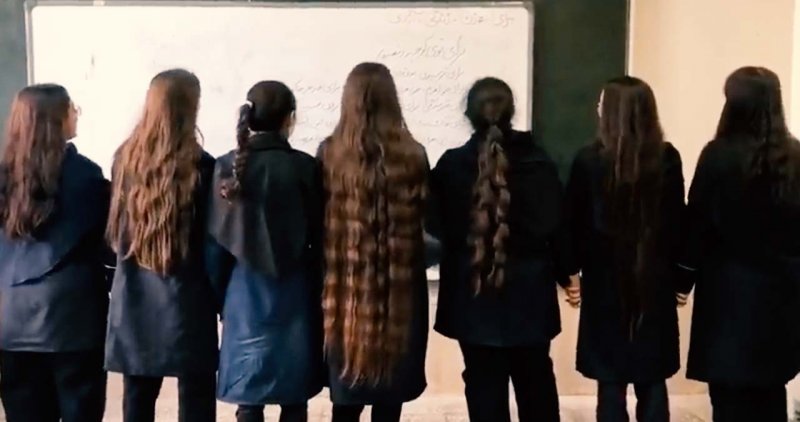Civil Disobedience of Schoolgirls in the Post-Mahsa Era
Civil Disobedience of Schoolgirls in the Post-Mahsa Era: Schoolgirls spinning their headscarves in their hands, a woman writing about her first time on the metro without a headscarf, and a girl saying there were four of us wearing chadors in class, but now I’m the only one.
A veiled woman living abroad says she is removing her hijab after 30 years, and her photo is published. Dozens of women and girls now walk around the city and streets, on foot or in cars, traveling or staying, with a scarf on their shoulders without a hijab, and sometimes they publish their pictures on social media or not.
All of this, according to a media activist, means we are in the post-Mahsa era, an era where the fear of compulsory hijab is almost over, whether some like it or not. Previously, the number of women who would remove their scarves in the street was few, but now they are countless.
They may not gather and chant slogans, but they walk, which means they are alive and living. It means ‘Woman, Life, Freedom’ has achieved its goals. But do these images mean that the power structure has easily retreated and accepted the demand against compulsory hijab?
Certainly not. In recent days, with the reopening of schools, one of the frequently published images and videos is the civil disobedience of female students. Not only do they not wear headscarves, disregarding them in school and on the street, but they are also bold and courageous enough to hold sit-ins in the schoolyard and call for the support and accompaniment of the school staff.
These under-18 teenagers are so bold that they not only boo the head of the education department or the invited Basiji speaker but also chant against them, and it may even lead to physical confrontations.
It seems the marathon of power between the carriers and agents of this civil disobedience, mainly schoolgirls, and the supporters and agents of maintaining the status quo has begun. School management, likely under pressure from the education department, is forced to increase strictness on students within the school environment using various tools. Outside the school and on the streets, as some videos show, we should expect harsh and sometimes physical and verbal confrontations between schoolgirls and the police or even plainclothes officers.
Governmental Nihilists
On the other hand, the ruling power, referring to the content of some protest slogans by students, has labeled them as abusive. However, they face the question of how, when various insults, threats, and humiliations are issued from power tribunes against others or non-conformists, no one protests, and they are not called abusive.
But now that the patience of the protesters has run out, and after years of peaceful protests and logical slogans, they have turned somewhat to harsh and radical slogans, which may sometimes contain inappropriate words, the voices of those close to the power have risen. Some have also pointed to the sexual slogans that were chanted 44 years ago by revolutionaries against Farah or the Shah’s family.
In addition, some so-called revolutionary and principled figures have started to belittle the protesters and call their demands vulgar. With foul language, a principled university professor said that instead of ‘Woman, Life, Freedom,’ protesters should say ‘Woman, Debauchery, and Prostitution.’ A former parliament member said they want to sleep with someone different every night and graze like animals. Sociologist Mostafa Mehraeen has named these individuals as governmental nihilists or value-empty value bearers.
He has written that this group of power holders, who appear respectable, are entangled in various corrupt behaviors in their lives and, due to a feeling of infinite freedom to do anything or say anything, suffer from a type of mental illness that can be called moral nihilism, faithlessness, and emptiness of any kind of meaning and world of meaning.
According to him, being afflicted with foul language and insulting society under the guise of revolutionary values is a defensive mechanism for these individuals to endure their own vile and ugly existence, which they cannot tolerate within themselves. This sociologist believes that, ironically, these individuals’ insults to women stem from their desire for love, which they have always been deprived of due to their repulsive existence, whether this love is of divine kindness, maternal love, spousal love, or the love of a friend, or even self-love.
Put Down Your Gun for Dialogue
In recent days, following the intensification of student protests in universities, especially Sharif University, and the subsequent brutal attacks and arrests of students, we have witnessed demands from power-supporting groups like the Student Basij, asking society and students to turn to dialogue to end the conflict.
Some have reminded that dialogue requires a prepared environment. A group that has closed its ears to opposing words for years, why and how is it now seeking dialogue, and whether this demand is genuine or merely a show to silence protests.
Others believe that how can one engage in dialogue with someone who holds the tools of physical repression? Dialogue requires a minimum level of power equality, especially while the process of arrests continues, some detained students have not been released, and the status of detained journalists is still unclear.
Some IT and internet specialists and staunch opponents of the protection plan are being arrested, and there are still many questions and ambiguities about the death of individuals like Nika Shahkarami. How can one trust the promise and demand for dialogue?
Iran Gate has specially covered the Mahsa Amini murder case. You can view the articles by searching for the keyword Mahsa Amini.
- The Crime of the Morality Police in Raisi’s Government
- Morality Police or the Chariot of Death

